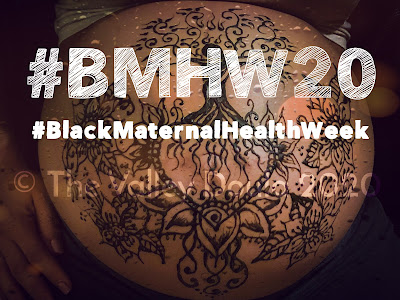Shifting Focus
I know there are other health concerns on making headlines these days, but I have had this on my heart for a while and have finally taken it from the "draft" section to the "publish." I can think of no better time than Black Maternal Health Week.
I’m passionate about many things, but at the top of my list is spreading evidence-based information (evidence-based means using the most up-to-date quality research). I truly believe the combination of intuition and evidence-based information is one of our most powerful decision-making tools, not just for birthing people, but for humanity. After all, how can we advocate for our rights if we don’t know them? How can we advocate for what is right if we don’t know where there is wrong? One of those wrongs is the alarming disparity between childbirth outcomes for women of color in comparison to their white counterparts.
Racial disparity in birth is not a “black problem” or a minority problem: it is an us problem. It is my problem, your problem, a human being problem. Full disclosure: I am a white, middle-class woman living in suburban Wisconsin, so I am writing to bring awareness and advocacy to an issue that I personally cannot ever fully experience or understand as my own, but one that must be exposed and addressed.
To begin with, the United States has one of the highest rates of maternal mortality in the developed world (GBD 2015 Maternal Mortality Collaborators, 2016), but that doesn’t make it any less shocking to learn a woman living in sub-Saharan Africa has an equal or better chance of surviving childbirth than a black woman living in certain parts of Mississippi (Nursing@Georgetown, 2018). Here in America, a black woman educated at the graduate level and of a high socioeconomic status experiences worse outcomes than that of a poor white woman with less than a high school education.
A pregnant black woman has to navigate multiple rocky territories: the oppression of women, the oppression of black people, and the oppression of black women in the US maternity care system.
Elizabeth Dawes Gay, of Black Mamas Matter, directly addressed the racial element of maternal mortality:
If you are interested in creating evidence-based birth preferences, knowing your rights in the maternity care system, or receiving holistic, compassionate support, please contact me and let’s chat.
We support. We share. We start the conversation.
We create evidence-based birth preferences. We know our rights.
For more information about creating a more just world for black families, please visit blackmamasmatter.org and evidencebasedbirth.com/racial-disparities-child-birth/.
I’m passionate about many things, but at the top of my list is spreading evidence-based information (evidence-based means using the most up-to-date quality research). I truly believe the combination of intuition and evidence-based information is one of our most powerful decision-making tools, not just for birthing people, but for humanity. After all, how can we advocate for our rights if we don’t know them? How can we advocate for what is right if we don’t know where there is wrong? One of those wrongs is the alarming disparity between childbirth outcomes for women of color in comparison to their white counterparts.
Racial disparity in birth is not a “black problem” or a minority problem: it is an us problem. It is my problem, your problem, a human being problem. Full disclosure: I am a white, middle-class woman living in suburban Wisconsin, so I am writing to bring awareness and advocacy to an issue that I personally cannot ever fully experience or understand as my own, but one that must be exposed and addressed.
To begin with, the United States has one of the highest rates of maternal mortality in the developed world (GBD 2015 Maternal Mortality Collaborators, 2016), but that doesn’t make it any less shocking to learn a woman living in sub-Saharan Africa has an equal or better chance of surviving childbirth than a black woman living in certain parts of Mississippi (Nursing@Georgetown, 2018). Here in America, a black woman educated at the graduate level and of a high socioeconomic status experiences worse outcomes than that of a poor white woman with less than a high school education.
THE STATS
Here is what the numbers look like for women of color in the United States:
A black woman in the United States is
A black woman in the United States is
- four times more likely to die in childbirth
- twice as likely to have a low birth weight infant
- more likely to have preterm birth rate (16% vs 10% in white women)
- more than twice as likely to lose a baby in stillbirth
- more than twice as likely to experience the death of their infant in the first year of life.
Research shows these differences persist even after controlling for other risk factors.
It’s not education level.
It’s not the presence or absence of prenatal care.
It’s not socioeconomic status.
It’s not education level.
It’s not the presence or absence of prenatal care.
It’s not socioeconomic status.
The cause of the increased maternal fetal and infant mortality is racism and chronic oppression.
A pregnant black woman has to navigate multiple rocky territories: the oppression of women, the oppression of black people, and the oppression of black women in the US maternity care system.
DISCRIMINATION AGAINST WOMEN
A 2018 study looking at the role of gender in healthcare for men vs. women revealed among other things, that women’s complaints are more likely to be attributed to emotion, women are less likely to be given appropriate pain management, and a woman is seven times more likely to have a heart attack misdiagnosed due to symptoms presenting differently than they do in males.
DISCRIMINATION AGAINST BLACK PEOPLE
A 2016 study of racial bias in pain assessment and treatment recommendations found doctors believed there were biological differences between black and white people. 29% of first year med students believed black people’s blood coagulates more quickly than whites’. 42% of second-years thought black people have thicker skin than white people. 14% believed that black people’s nerve endings are less sensitive than white people’s. Another recent study showed that, even when warranted, African Americans are 34% less likely than white people to be prescribed opioids for similar conditions.
DISCRIMINATION AGAINST PREGNANT BLACK WOMEN
When a black woman is doubted or dismissed in pregnancy, labor, birth, or postpartum, she is forced to endure being devalued by the professional whose literal only job is to help her, and studies show this can make the difference between life and death. In the labor room, if her partner is also black, he/she typically feels trapped because if they stand up to medical authority in defense of their birthing partner, they risk being perceived or treated as a threat, again due to racial bias. At the September 2018 Maternal Health Task Force symposium, Nina Martin explained, “Once a baby is born, he or she becomes the focus of medical attention. Mothers are monitored less, their concerns are often dismissed, and they tend to be sent home without adequate information about potentially concerning symptoms. For African American mothers, the risks jump at each stage of the labor, delivery, and postpartum process.”Elizabeth Dawes Gay, of Black Mamas Matter, directly addressed the racial element of maternal mortality:
“Those of us who want to stop black mamas from dying unnecessarily have to name racism as an important factor in black maternal health outcomes and address it through strategic policy change and culture shifts. This requires us to step outside of a framework that only looks at health care and consider the full scope of factors and policies that influence the black American experience. It requires us to examine and dismantle oppressive and discriminatory policies. And it requires us to acknowledge black people as fully human and deserving of fair and equal treatment and act on that belief.”
WHAT DO WE DO?
We equip ALL families with the tools and resources to become empowered. It is vital that families of color receive respectful, evidence-based care.If you are interested in creating evidence-based birth preferences, knowing your rights in the maternity care system, or receiving holistic, compassionate support, please contact me and let’s chat.
We support. We share. We start the conversation.
We create evidence-based birth preferences. We know our rights.
For more information about creating a more just world for black families, please visit blackmamasmatter.org and evidencebasedbirth.com/racial-disparities-child-birth/.
References
Black Mamas Matter Alliance, & Center for Reproductive Rights. (2016). Black Mamas Matter: Advancing the Human Right to Safe and Respectful Maternal Healthcare. Center for Reproductive Rights. http://blackmamasmatter.org/wp-content/uploads/2018/05/USPA_BMMA_Toolkit_Booklet-Final-Update_Web-Pages-1.pdf
Center for Reproductive Rights. (2014). Racial and Gender Discrimination in U.S. Health Care. Center for Reproductive Rights. https://tbinternet.ohchr.org/Treaties/CERD/Shared%20Documents/USA/INT_CERD_NGO_USA_17560_E.pdf
Dekker, R. (2017, August 15). Racial Disparities in Childbirth. Evidence Based Birth®; Evidence Based Birth®. https://evidencebasedbirth.com/racial-disparities-child-birth/
GBD 2015 Maternal Mortality Collaborators. (2016). Global, regional, and national levels of maternal mortality, 1990-2015: a systematic analysis for the Global Burden of Disease Study 2015. In https://www.thelancet.com/journals/lancet/article/PIIS0140-6736(16)31470-2/fulltext. https://www.thelancet.com/pdfs/journals/lancet/PIIS0140-6736(16)31470-2.pdf
Hoffman, K. M., Trawalter, S., Axt, J. R., & Oliver, M. N. (2016). Racial bias in pain assessment and treatment recommendations, and false beliefs about biological differences between blacks and whites. Proceedings of the National Academy of Sciences, 113(16), 4296–4301. https://doi.org/10.1073/pnas.1516047113
Maternal Health Task Force. (2018, June 15). Global Maternal Health Symposium. Maternal Health Task Force. https://www.mhtf.org/global-maternal-health-symposium/
Meghani, S. H., Byun, E., & Gallagher, R. M. (2012). Time to Take Stock: A Meta-Analysis and Systematic Review of Analgesic Treatment Disparities for Pain in the United States. Pain Medicine, 13(2), 150–174. https://doi.org/10.1111/j.1526-4637.2011.01310.x
Nursing@Georgetown. (2018, February 5). How Does Race Impact Childbirth Outcomes? @GuOnlineNursing; Georgetown University. https://online.nursing.georgetown.edu/blog/race-disparities-maternal-infant-outcomes/
Pascucci, C. (2020). Birth Monopoly. Birth Monopoly. https://birthmonopoly.com/
Roeder, A. (2019, December 21). America is Failing its Black Mothers. Harvard Public Health Magazine. https://www.hsph.harvard.edu/magazine/magazine_article/america-is-failing-its-black-mothers/
Samulowitz, A., Gremyr, I., Eriksson, E., & Hensing, G. (2018). “Brave Men” and “Emotional Women”: A Theory-Guided Literature Review on Gender Bias in Health Care and Gendered Norms towards Patients with Chronic Pain. Pain Research and Management. https://www.hindawi.com/journals/prm/2018/6358624/





Comments
Post a Comment